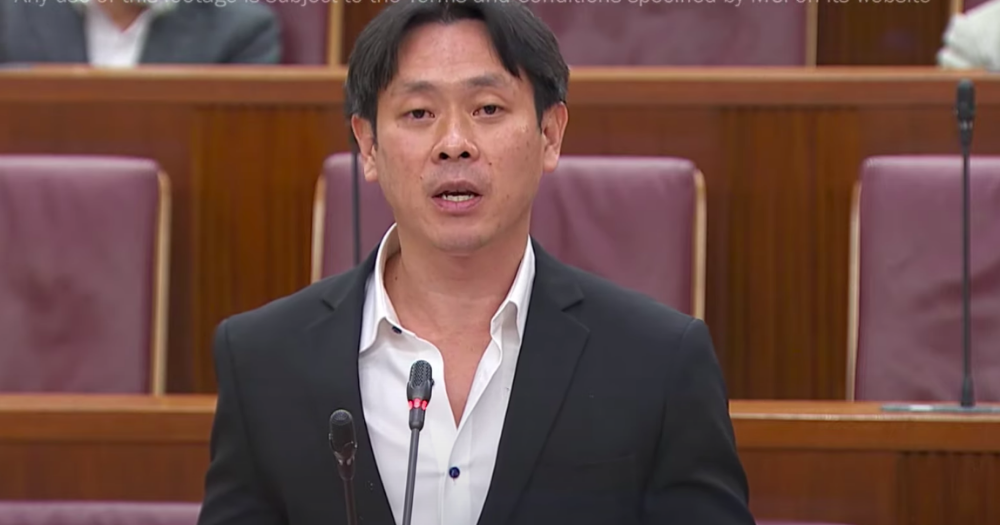In his Budget debate speech in Parliament on Thursday (Feb. 25), Member of Parliament Louis Ng called for the Ministry of Education (MOE) to improve performance appraisal processes for teachers and to abolish the bell curve-style quota system for performance grades.
"It seems contradictory to me that teachers tell their students that students are no longer ranked and compared relative to their peers while they themselves are ranked and compared relative to other teachers," he said.
Teachers placed on bell curve with quota on number who are given each grade
Calls to review the MOE teachers' appraisal process have previously been made in Parliament by MPs such as Denise Phua, Zainal Sapari, Intan Mokhtar, and Ng himself.
In his speech on Thursday, Ng explained the two-step process the performance appraisal for teachers involves:
- First, the teacher's RO assesses the teacher.
- Then, the RO takes the assessment to a Ranking Panel of senior staff members, who decide on the rank and grades of all teachers in the school.
- Teachers are then ranked and given a grade on the A, B, C, D, E grading scale. There is a quota for each grade, meaning that a school can only award a limited number of teachers each grade.
According to Ng, 5 per cent of each school’s teachers must be graded C-, D, or E.
80 per cent of teachers agreed that ranking is not best appraisal method
Ng said he spent the past six months listening to some of the approximately 1,200 teachers who were surveyed by the Singapore Teachers' Union.
He noted that over 80 per cent of teachers and about 70 per cent of reporting officers (ROs) surveyed agreed that ranking is not the best way to appraise all job-holders.
"I know that our performance management system of stack ranking is a sacred cow. We have used this system for decades. But for once, I’m not asking for a scared cow to be slaughtered.
[...] I’m asking for us to look after this sacred cow better and for our appraisal system, again, to be more standardised, transparent, fair and formative."
Some prefer "yes" men, some rank friends higher, some pre-select teachers to get bad grades
Ng proposed that MOE standardise the appraisal process and require all schools to follow it. Three-quarters of teachers surveyed agreed that this should be done, he said.
While MOE provides guidelines and conducts trainings to advise the Ranking Panels at different schools, the accounts shared by the surveyed teachers showed that these are not robust enough to make sure that appraisals are standardised, said Ng.
He mentioned that some teachers reported some ROs taking irrelevant and subjective considerations into account.
- One teacher said that some ROs prefer "Yes" men: "If you are one who asks questions and gives alternate suggestions, you are deemed to be uncooperative and calculating."
- Another teacher claimed that their RO favours staff who are his friends or who used to work with him in other schools.
Some ROs also, in turn, expressed frustration at the Ranking Panels, added Ng. Half of the ones he spoke to said that members of the Ranking Panel have unequal say in deciding who gets what grade, with personalities and politics coming into play in some cases too.
According to Ng, One RO said staff on the panel tend to play up their own teachers while criticising others, in order to ensure that they themselves are ranked as being effective.
Another, he said, added that to speak up for unfairly-ranked teachers would mean risking "suffering the same fate".
Yet another teacher, Ng said, mentioned that some department heads even went so far as to "pre-select" teachers to get bad grades and "fulfil the prophecy" by assigning them unimportant tasks.
Thus, Ng proposed, MOE should provide better clarity on its guidelines, and teachers should be told what specific standards are required to achieve different grades.
In addition, he said, the ministry should formalise its guidelines on teacher appraisal as requirements, as there may be a big difference in robustness and subjectivity of processes between different schools.
"These stricter standards will move us towards consistency, limit biases, and emphasise the performance of teachers," Ng said.
More transparent appraisal process
Ng suggested that MOE enforce a clearer and more consistent feedback policy for performance appraisals.
He said that again, almost 80 per cent of teachers surveyed said they didn't feel that the ranking process is transparent.
Some teachers, he explained, said their performance grades were never explained to them. Even when some asked about the process, they were given no explanation or told by their RO that there was no way to discuss the grades.
MOE could therefore consider implementing a standard procedure for how schools should respond when teachers request feedback and clarifications about their grades, Ng said.
He also suggested that MOE work together with teachers to strengthen the ministry's communication policies, such as by implementing a whistleblowing mechanism for teachers to use when their schools do not follow MOE's communication policies on appraisal.
Remove quotas for each grade
Finally, Ng proposed, MOE should remove the quota for each grade, a proposal which he said 80 per cent of the teachers surveyed strongly agreed with.
"This means a teacher’s grade would no longer be affected by the limited number of As, Bs, Cs, and Ds," Ng said.
In the current system, this means that a good teacher in a school surrounded by very good teachers could hypothetically still receive a poor grade, due to the quota.
The quota system disincentivises teachers from working in a school where other teachers are better than them, he argued.
He noted that Minister for Education Lawrence Wong had previously said that schools have flexibility in assigning grades to teachers.
However, Ng said that in practice, "virtually all" schools had teachers with C-, D, or E grades.
"This may be because of the additional paperwork, scrutiny, and justifications needed to exercise that flexibility," he hypothesised.
Teachers who receive grades of C- and below also face punitive measures, such as being ineligible for promotion for three years, as well as not being eligible to take Professional Development Leave.
Ng also suggested that MOE remove these punitive measures, and said that 75 per cent of teachers surveyed agreed with it:
"Performance management should be formative, not punitive. Teachers who have struggled should not be denied the full resources to grow or the full prospect of being rewarded.
Three years with 0 per cent chance of promotion is enough to make anyone lose interest in their profession."
Top photo via YouTube / MCI.
If you like what you read, follow us on Facebook, Instagram, Twitter and Telegram to get the latest updates.

